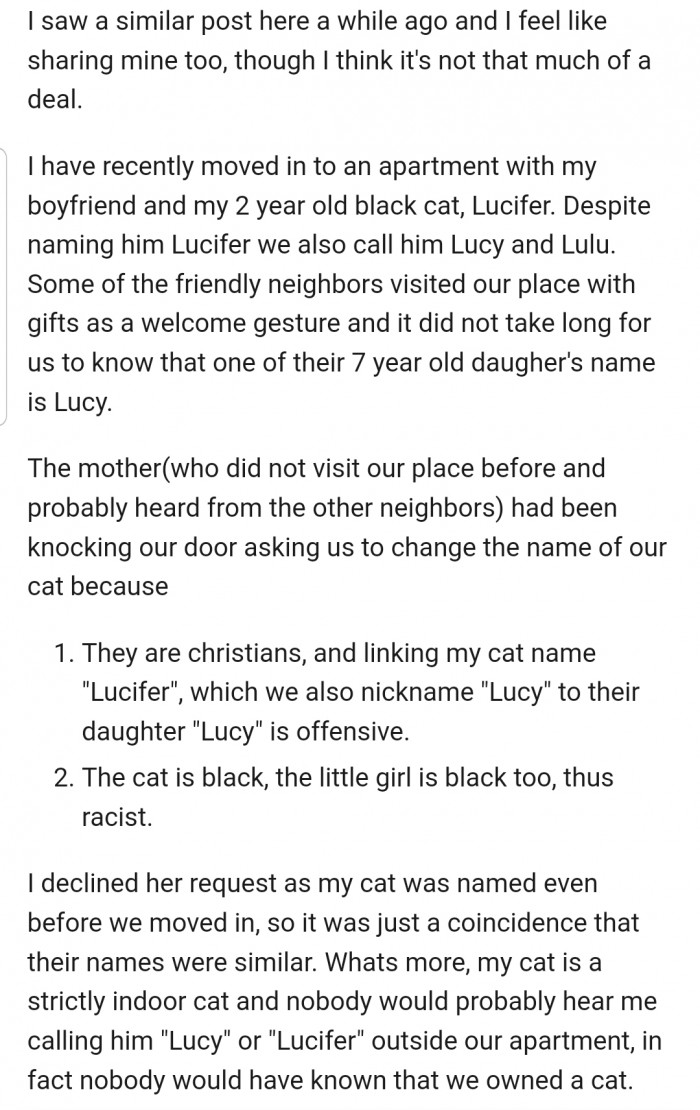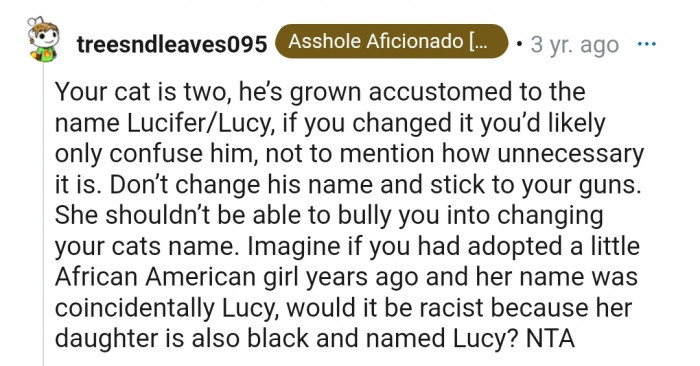Redditor Refuses To Change Cat’s Name After Neighbor Complained It Was Offensive
Names are pretty important. If they weren’t, we wouldn’t have them.
While we are born with our names and often grow to love them, we may one day have to name a child or pet, which requires much thought.
If your pet or child will be stuck with that name for the rest of their lives, you must give them a likable one.
For pets, different factors can inform your name choice aside from personal preference, such as how you got the pet or their appearance.
That’s why pets worldwide have some of the most adorable names. It’s simply because they are the cutest creatures you’ll ever find!
However, there are other things to consider, like choosing a name that’s easy to recognize, as animals respond better to names with one or two syllables.
We found a Redditor who gave her pet a seemingly perfect name but was asked by her neighbor to change it.
OP shared on the AITA subreddit that she had just moved into a new apartment not too long ago, and her new neighbor complained about her cat’s name.
She stated that she was uncomfortable with them calling the cat Lucy, as it’s her daughter’s name. In addition, OP's cat happened to be black, the same as her neighbor's daughter, which led to OP being accused of racism.
OP further stated that she had no plans to change her cat’s name, leading her to ask the very critical question of AITA.
Check out the full story below!
What do you do when your neighbor is offended by your cat's name?

OP just moved into a new neighborhood, but little did she expect that trouble was going to walk right to her doorstep

OP's neighbor has been insisting that they change their cat's name, as it's offensive. But OP isn't willing to shift grounds on this matter.

Understanding Name Associations
Dr. Amanda Green, a social psychologist, emphasizes that names carry significant emotional weight and can evoke strong associations.
This situation illustrates how names can trigger feelings tied to personal history and identity, especially within neighborhood dynamics.
Research suggests that individuals often attach meanings to names that can lead to misunderstandings or conflict.
The Significance of Names in Relationships
Dr. Angela White, a relationship psychologist, emphasizes the emotional weight names carry in interpersonal dynamics.
In this case, the neighbor's complaint about the cat's name illustrates how shared names can evoke feelings of discomfort and conflict.
Research shows that names often symbolize deeper emotional ties and can influence perceptions within relationships.
The post, which has since gone viral, garnered 8.5k upvotes and 1.2k comments. We gathered the best reactions for you:
"Tell them to change their kid's name"

"Sacrifice a goat in your front yard so she never darkens your doorstep again."

"Wanted to point out that there’s an actual kitty DISNEY CHARACTER named Lucifer! The black cat in Cinderella!"

When a neighbor complains about a name, it can reveal deeper issues related to identity and community relations.
According to studies in social psychology, perceived threats to one's identity can provoke defensiveness and conflict.
Understanding these dynamics is crucial for navigating interpersonal relationships.
Studies published in the Journal of Social Psychology suggest that names can create a sense of ownership and identity, which can complicate relationships when names overlap.
This situation highlights the need for open discussions about the implications of naming choices.
Understanding the emotional significance behind names can help mitigate conflicts.
"Tell them to change their daughter's name if it's such a big deal to them"

"You don't need to change your cat's name for someone who will basically never interact with the cat."

"I have a cow named Greg. Does that mean I am indirectly calling every man I meet named Greg a cow?"

The Role of Communication in Resolving Conflicts
Effective communication is key to resolving conflicts arising from name associations.
Experts recommend discussing feelings openly to prevent misunderstandings and foster empathy.
Research indicates that couples who communicate effectively are better equipped to handle sensitive topics.
Communication as a Conflict Resolution Tool
Effective communication is crucial for resolving conflicts related to naming and identity.
Experts recommend using empathetic language and active listening to navigate these sensitive discussions.
For example, expressing feelings about the name choice can help foster mutual understanding and promote cooperation.
"Tell your neighbor Lucy and Lucifer literally derive from the same word."

"Your neighbors are crazy if they think they get to tell you what to name your cat"

"Don’t change his name and stick to your guns. She shouldn’t be able to bully you into changing your cat's name"

Moreover, the emotional significance of names can reflect attachment and identity, as noted in attachment theory.
When a name evokes strong feelings, it may trigger insecurities related to one's self-image or relationships.
Recognizing these triggers can help both parties approach the situation with greater sensitivity.
Research indicates that couples who engage in open dialogue about sensitive topics tend to experience greater relationship satisfaction.
According to the Journal of Marriage and Family Therapy, discussing naming choices can enhance emotional intimacy and trust.
In this case, exploring the implications of the cat's name can help strengthen the bond between partners.
"Are people really that entitled?"

"You are obviously in the right, and messing with her would be fun, but you really don't want that level of crazy on your doorstep"

"OP, those neighbors are trouble. Expect a lot of BS from them in the future"

Finding Compromise in Naming
To navigate this situation, engaging in discussions about naming conventions that honor both parties' feelings can be beneficial.
Creating a list of potential names that resonate with both individuals can foster cooperation and mutual respect.
Studies show that collaborative decision-making strengthens relationships by promoting shared ownership of choices.
Exploring Emotional Attachments to Names
Emotional attachments to names can reveal deeper relational dynamics and personal histories.
Dr. Melanie Brown, a cultural psychologist, notes that names often symbolize significant memories and relationships, which can complicate matters.
Recognizing these emotional ties can help partners navigate their feelings and find ways to honor each other’s perspectives.
"The only way to deal with people like this is to make it clear that she has no authority over you, not even pretend power"

"Compromise and rename it Satan, and call it by saying 'Hail Satan!'..."

The Reddit community all agrees that OP is NTA, as they believe the name is not racist and it’s not the neighbor's place to dictate what OP should name her cat.
We do hope this doesn't cause bad blood between both families, though. It's always great to see neighbors relate cordially with each other, and we're looking forward to a peaceful resolution.
Do you think OP should rename her cat because of her neighbor’s complaints? Let us know in the comments section below!
Therapists recommend working together to create a naming agreement that respects both partners' feelings.
This could involve brainstorming alternative names that resonate with both individuals while addressing emotional sensitivities.
Research shows that collaborative decision-making can enhance relationship satisfaction and reduce conflict.
Finding Common Ground in Relationships
Finding common ground in relationships is essential, particularly when opinions diverge.
Research indicates that mutual understanding and respect for differing viewpoints can strengthen relationships.
This approach not only facilitates conflict resolution but also promotes emotional intelligence among friends.
Ultimately, fostering open communication and empathy can help resolve conflicts arising from naming choices.
By understanding each other's emotional attachments, partners can navigate these sensitive discussions with care and respect.
This approach not only resolves current disagreements but also strengthens the foundation for future discussions.
Psychological Analysis
This scenario reflects the complexities of navigating personal feelings and shared identities in relationships.
Understanding each partner's perspective can facilitate healthier discussions and strengthen the relationship.
Analysis generated by AI
Analysis & Alternative Approaches
This situation emphasizes the emotional significance that names can hold in relationships and the need for open communication.
By addressing the underlying feelings surrounding naming choices, partners can foster understanding and connection.
Ultimately, prioritizing empathy and compromise can enhance relationship dynamics and prevent conflicts.
Additionally, involving the neighbor in the naming process can help alleviate discomfort and reinforce their sense of agency.
Research indicates that allowing individuals to have a say in decisions that affect them can enhance feelings of validation and respect.
This collaborative approach can reduce conflict and foster better neighborly relations.
The Importance of Emotional Validation
Ultimately, validating each other's feelings about naming can pave the way for healthier discussions.
Psychological research emphasizes that emotional validation promotes understanding and can reduce defensiveness in conversations.
Practicing empathy and actively listening to each other's concerns can lead to a more harmonious resolution.
In conclusion, navigating the emotional complexities of naming decisions requires sensitivity and open communication.
Addressing feelings surrounding names can foster deeper connections and mutual understanding between neighbors.
Analysis & Alternative Approaches
In summary, the dynamics of naming a pet can evoke strong emotions that reflect deeper relational issues.
As emphasized by psychological research, open communication and emotional validation are essential in resolving conflicts and fostering healthy relationships.



